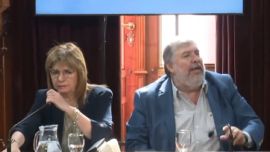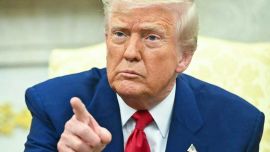The Venezuela issue dominated the political agenda this week in Argentina. The focus was put on the country’s position before different multilateral organisations, namely the United Nations and the Organisation of American States, where Argentina’s representatives voted for and against a series of reports accusing the Nicolás Maduro’s government of the systematic violation of human rights, including 7,000 executions. The report, put together by High Commissioner for Human Rights, former Chilean president Michelle Bachelet, has become an ideological boundary within Argentina, and particularly within the governing Frente de Todos coalition. And it has once again become a headache for President Alberto Fernández, whose authority is coming under increased scrutiny with the shadow of Vice-President Cristina Fernández de Kirchner looming largely in the background.
As repeated tirelessly in this column, it doesn’t really matter whether Cristina is calling the shots, whether her political henchmen are acting independently, or if Alberto is acting out of his own accord, trying to please his vice-president and keep his coalition united. The end result is the same: increased uncertainty, which ultimately feeds Argentina’s risk thermometer: the dollar-peso exchange rate. With the black market (“dólar blue”) rate hitting record after record, the bleeding of the Central Bank’s reserves continues, rendering emergency measures announced by both Central Bank chief Miguel Ángel Pesce and Economy Minister Martín Guzmán increasingly ineffective. Thus, one way to interpret the current vicious cycle is that the more dysfunctional the governing coalition looks, the greater is the scepticism regarding President Fernández’s capacity to govern, which in turn raises suspicions that “Cristina wants to turn us into Venezuela,” further fueling dollar demand (with the Central Bank printing pesos 24/7), generating further political instability. The cycle needs to stop in order to avert an all-out crisis.
Venezuela was one of the Kirchners’ key strategic allies during the first decade of the 2000s. Then-president Néstor had the courage to host George W. Bush at the IV Summit of the Americas, receiving him in Mar del Plata for an infamous “anti-summit” starring Hugo Chávez and Diego Maradona (during which they called POTUS “human waste”). Néstor, of course, had lifted Argentina out of its worst economic crisis ever, riding the commodities super-cycle, as Latin America surfed the ‘Pink Tide’ that saw most countries elect leftist populist leaders including Luiz Inácio Lula da Silva in Brazil, Evo Morales in Bolivia, and Rafael Correa in Ecuador. Chávez financed Fernández de Kirchner’s presidential campaign — remember Antonini Wilson and his suitcase filled with US$800,000? — while lending money to Argentina at a time when the country was locked out of international credit markets.
Later, Mauricio Macri built a major part of his political strategy by antagonising the Kirchners on the issue of Venezuela, to the point where it became the cornerstone of his foreign policy. Aligned with the White House and Brazil’s Jair Bolsonaro, the Macri administration denounced human rights violations in Maduro’s Venezuela, recognised Juan Guaidó as interim president and pushed for the ouster of the Bolivarian regime. (In a previous column, “Is Argentina really on track to become the next Venezuela?”, I explored the sociology behind the cultural construction of the Venezuelan dystopia/utopia that characterises the divide between Kirchnerites and anti-Peronists, to which Cristina and Macri spoke to electorally).
Among the more radicalised members of the ruling coalition, allegiance is owed to Venezuela and Chávez. Denouncing human rights violations by the Maduro regime is playing to the tune of the CIA and the hegemonic media that pushes for a neoliberal economic and cultural order. At the other end of the political spectrum, die-hard Macri fans (and those who follow ultra liberals such as José Luis Espert and Javier Millei) have adopted, as a war cry, the idea that Cristina and the La Cámpora youth organisation led by her son, Máximo, are pursuing a “Bolivarian model” that is defined by incompetent statism and Chávez-style authoritarianism. Both sides feed the eco-chamber of hate that drags the rest of their coalitions further away from positions of dialogue and consensus.
In a pathetic contradiction, Argentina ambassador to the OAS, Carlos Raimundi, initially rejected the Bachelet report, days after another envoy, Federico Villegas, had voted in favour of it before the UN Human Rights Committee in Geneva. Alicia Castro, who was the Kirchners’ ambassador to Venezuela, resigned from a post she was essentially ousted from (President Fernández offered her the embassy in Moscow), lambasting the government. Other fringe elements among the Kirchnerites, including Hebe de Bonafini, called the vote an affront to the legacy of Néstor Kirchner. Alberto and his foreign minister, Felipe Solá, were forced onto the airwaves to explain that Argentina’s position had never changed (against foreign intervention but also in defence of human rights). Cristina, meanwhile, remained quiet.
Venezuela is important for the government for many reasons, not least because the United States has controlling power at the International Monetary Fund. Yet, the underlying problem here is the incapacity of the Fernández administration to build and develop its credibility. Feeding a negative feedback loop, Alberto is making it more difficult for himself to lead Argentina in the middle of a massive economic crisis and a global pandemic. The opposition plays its role as well, taking advantage of the political circumstance, but it is on those who walk the halls of the Casa Rosada to take charge.




















Comments